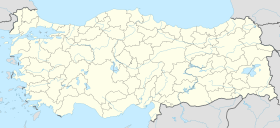Colonae
| αἱ Κολωναί | |
| Location | Alemşah, Çanakkale Province, Turkey |
|---|---|
| Region | Troad |
| Coordinates | 39°41′23″N 26°9′48″E / 39.68972°N 26.16333°ECoordinates: 39°41′23″N 26°9′48″E / 39.68972°N 26.16333°E |
| History | |
| Founded | 7th century BC |
Kolonai (Ancient Greek: αἱ Κολωναί hai Kolōnai) was an ancient Greek city in the south-west of the Troad region of Anatolia. It has been located on a hill by the coast known as Beşiktepe ('cradle hill'), about equidistant between Larisa to the south and Alexandreia Troas to the north. It is 3.3 km east of the modern village of Alemşah in the Ezine district of Çanakkale Province, Turkey. Its name in Ancient Greek is the plural form of κολώνη (kolōnē), 'hill, mound', a common name for promontories with hills on them in the Eastern Mediterranean. It is not to be confused with 'Lampsacene' Kolonai, a settlement situated in the hills above Lampsacus in the north-east of the Troad.
The obscure local historian Daës of Kolonai (Δάης ὁ Κολωναεύς) is the only literary figure from Kolonai who is known. As a writer of local history he can date no earlier than the late 5th century BC, and as a citizen of Kolonai he must date before c. 310 BC when Kolonai became synoecized with Alexandreia Troas; his floruit is therefore likely to have been in the 4th century BC. The Augustan geographer Strabo provides the only information on Daës in a brief quotation from his work on the history of Kolonai: "Daës of Kolonai says that the temple of Apollo Killaios was first founded in Kolonai by the Aeolians who sailed from Greece". The cult of Apollo Killaios was local to the southern Troad and Lesbos and is first mentioned in Homer's Iliad. The reference to the foundation of Kolonai by Aeolians indicates both that the inhabitants of Kolonai in the 4th century BC considered themselves to be ethnically Aeolian and that Daës' work dealt with the early history of his polis. The Aeolian identity of 4th-century BC Kolonai is independently confirmed by the legends on their coins which were spelt in the Aeolic Greek dialect.
...
Wikipedia

